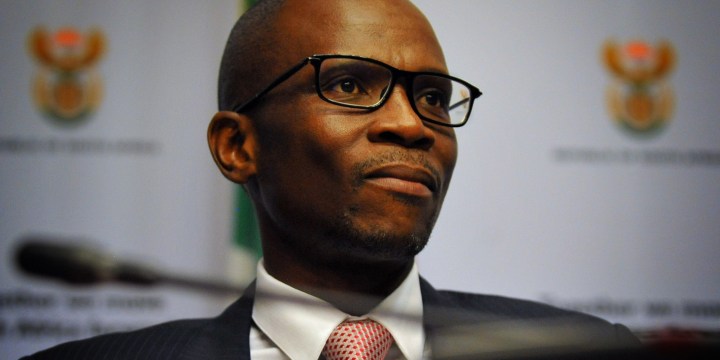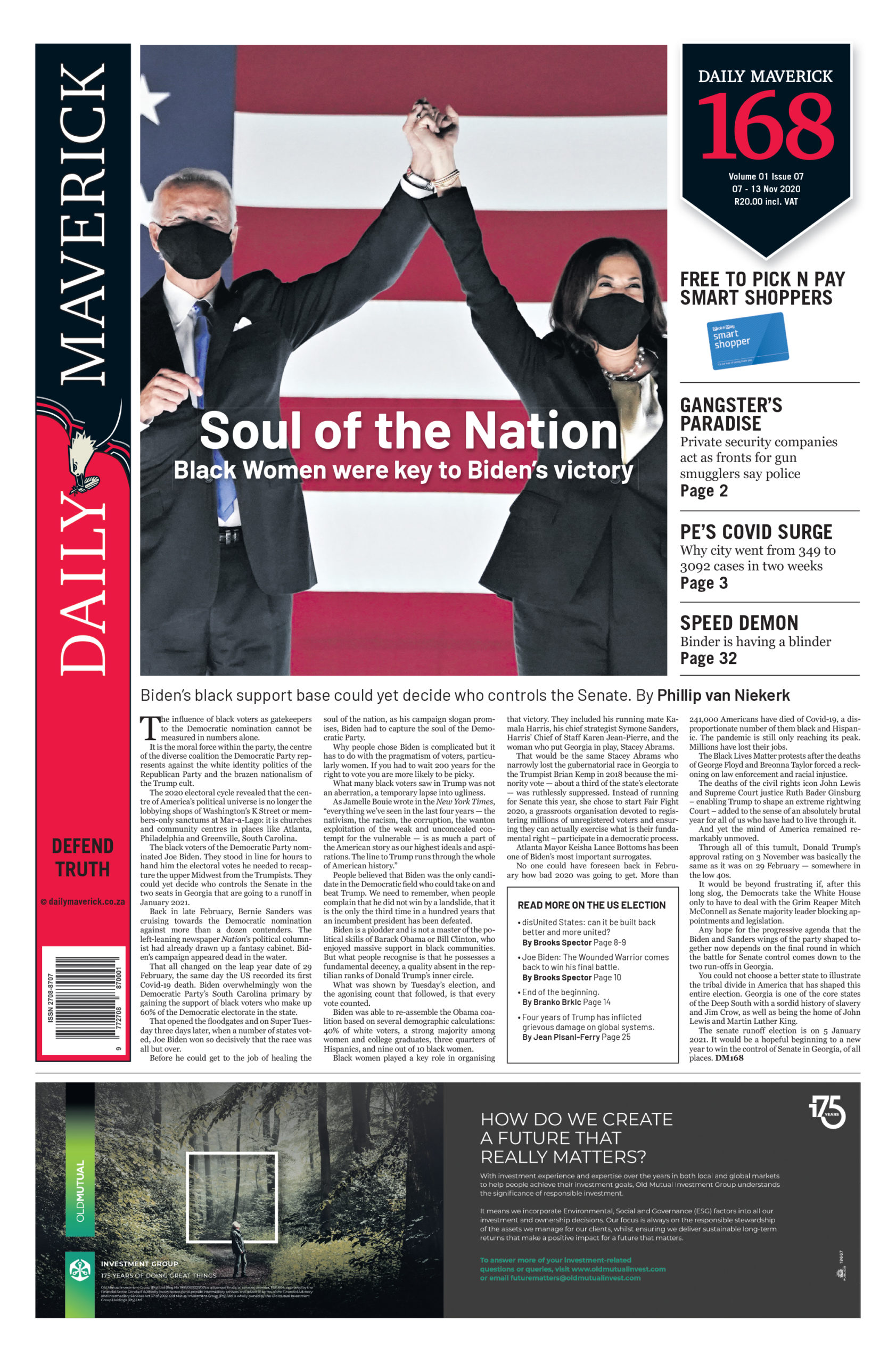BUSINESS MAVERICK 168
SA Inc turnaround: Masondo seeks that implementation groove

Deputy Finance Minister David Masondo has the Herculean task of turning around the SA Inc ship and improving efforts to implement pro-growth and investment reforms.
First published in Daily Maverick 168
The government is facing increased pressure to implement structural reforms to yank SA out of a fiscal and economic conundrum so daunting that time is running out for the country to avoid becoming a failed state.
SA’s decline has been long in the making, but the Covid-19 pandemic has accelerated it, with the country’s key metrics for development heading fast in the wrong direction.
The lockdown has erased more than a decade of fragile GDP growth – effectively taking SA back to 2007 levels. At 82% of GDP (or nearly R4-trillion) in 2020/21, the national debt is at a point where SA soon won’t be able to service it. The government continues to live beyond its means; with expenditure still exceeding revenue (mainly generated from taxes) as seen in the fiscal deficit rising from 6.4% of GDP at the start of 2020 to 16%. Without economic growth, SA might join the ranks of debt defaulters such as Argentina or Zambia.
Deputy Finance Minister David Masondo has the Herculean task of turning around the SA Inc ship and improving the government’s efforts to implement pro-growth and investment reforms.
Masondo, a former national chair of the Young Communist League of SA with left-leaning ideas on managing the economy such as unleashing quantitative easing to lower the fiscal deficit, has offered critical, but obvious views on SA’s failed attempts to reform the economy.
“The pace at which the reforms are implemented is worryingly slow,” he said.
“There are a number of reasons why the implementation of these reforms is proving to be slower and more difficult than it should be. These include technical difficulty, vested interests, lengthy legislative processes, a lack of capacity in some departments and agencies, conflicting political considerations, and in some cases a lack of buy-in and the need for further consultation.”
Arguably, “conflicting political considerations” is most accurate.
Opposing ideologies
A cascade of reports – with opposing ideas on reform measures – has emerged over the past year from the National Treasury, business lobby groups, President Cyril Ramphosa’s economic advisory panel, and Masondo’s ANC.
For instance, Masondo is responsible for overseeing the implementation of pro-growth reforms contained in the Treasury’s report, which turned one on 27 August. The report makes far-reaching recommendations to reduce the cost of doing business in SA and promote productivity and competition by increasing the role of the private sector in all areas of the economy including energy, telecommunications, ports and rails.
Where state-owned entities (SOEs) have failed in leading SA’s economic development since 2004, the Treasury urges the government to embrace the private sector as a partner in the delivery of reforms. Subsequent reports from business and Ramaphosa’s economic advisers strongly support the Treasury’s approach.
Meanwhile, the ANC’s economic transformation committee recently published an alternative growth plan that contradicts the Treasury’s report by calling for the reconstruction of the economy post-Covid-19 to be state-led. In other words, the ANC wants to maintain state power over the economy.
“This shows how the ANC has an absolute policy paralysis and is plagued by factionalism, which manifests itself in grandstanding on every issue,” said Iraj Abedian, a senior economist at Pan-African Investment and Research Services.
“People who write ANC policies have no clue about economics. They don’t check the facts, but repeat ideology. In this context, there will be big policy differences.”
So, will it be hard to convince the ANC, which Masondo serves on its national executive committee and the economic transformation committee, to allow the private sector to play a greater role in the economy?
Masondo said the ANC accepted the role of the private sector in driving investment to grow the economy, creating jobs, and enlarging the tax revenue base to provide public services.
“Obviously, state involvement in the economy is necessary and omnipresent. The moot point is about the quality and scope of such involvement.
“There is generally a consensus, even within the ANC and the political left, that any government intervention must increase economic growth, including addressing the structural growth constraints. This requires us to reduce the cost of doing business and provide reliable and affordable electricity, rail, road infrastructure, ports, water, telecommunication, full-spectrum utilisation, and education,” he said.
Masondo argued that the private sector should play a greater role in the economy’s reconstruction during the Covid-19 pandemic because “the government on its own cannot afford to finance the requirements of our network industries”.
He pointed to Durban’s port system managed by state-owned Transnet, saying there were opportunities for private sector players to develop it further to become a transhipment hub in SA. “Transnet cannot build this on its own. Such a super-container terminal will require private-sector participation.”
Fast-tracking reforms
Doing this will require the government to rethink the role of SOEs and reforming their ownership models to include private sector participation. Masondo admits that most SOEs will probably not meet the government’s vision of being efficient, financially sound and well-governed by 2030. This has paved the way for the government to review the number and impact of SOEs in the economy, and potentially sell some entities to the private sector.
The work to cut the number of SOEs (about 700 entities) and tracking the implementation of reforms identified by Ramaphosa will be on Masondo’s to-do list through an initiative called Operation Vulindlela, which sits between the Treasury and the Presidency. Operation Vulindlela is not a reform-implementing initiative, but provides oversight in the government’s work of mounting reforms.
An Operation Vulindlela technical team, which is yet to be appointed with individuals from the private and public sector, will work with Ramaphosa, all five economic clusters of Cabinet and government departments, to draw up priority reforms and a plan with timelines to implement them.
Masondo is already working with the government to implement priority reforms in the energy sector, including fast-tracking the emergency procurement of 2,000MW of power to address Eskom’s supply gap; opening bid window five for the procurement of renewable energy; and amending laws to enable municipalities to procure energy from independent power producers.
The key question is how Operation Vulindlela will be different when the government suffers from chronic implementation paralysis – often made worse by the Treasury and the Presidency failing to persuade government departments to act with speed.
To this, Masondo said: “Regular progress reports on the implementation of the prioritised reforms will be provided to the deputy minister of finance, the economic cluster, Economic Cabinet Committee and the president, with recommendations for interventions or engagements to accelerate progress.”
The biggest challenge for Operation Vulindlela was capacitating it with individuals from the government who put the interest of the nation first and not party politics, said Lumkile Mondi, senior lecturer at Wits University’s School of Economics and Business Science.
“SA is endowed with skilled black professionals. But black professionals that work for the government are mostly deployed by the ANC through cadre deployment; they are there to serve with a political party. People have to understand that government is about service and not about a party,” said Mondi. BM/DM


















 Become an Insider
Become an Insider
Comments - Please login in order to comment.